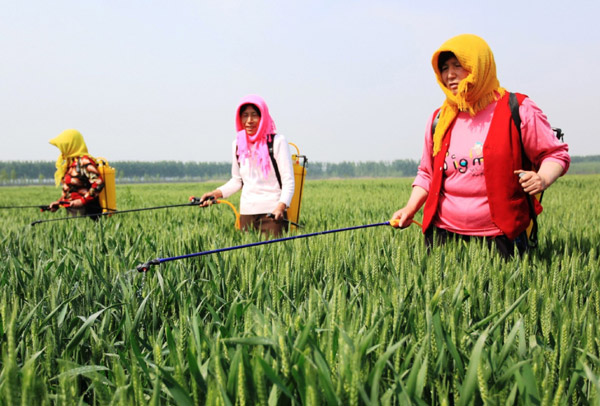Society
Province planning to purge pesticide abuse
By Tan Zongyang and Zhao Ruixue (China Daily)
Updated: 2011-05-18 08:38
 |
Large Medium Small |
BEIJING / JINAN - East China's Shandong province is about to launch a licensing system in an attempt to limit the availability of pesticides, because misuse of the agricultural chemicals is a major cause of contamination in agricultural products.
 |
|
Farmers spray pesticides in a wheat field in East China's Shandong province, on Tuesday. Liang Xiaopeng / for China Daily |
The idea was discussed via an online legislative hearing and is pending approval from the provincial people's congress next week, Yang Lijian, director of the province's Institute for the Control of Agrochemicals, told China Daily on Tuesday.
If approved, the rule will come into effect three months later and is likely to purge a large number of unqualified players from the pesticide market, Yang said.
The new rule will require pesticide dealers to apply for business licenses from the local agricultural authorities before they can sell farming chemicals.
It is the first time Shandong - the country's largest exporter of agriculture products - has raised the threshold for the sale of agricultural chemicals since a similar licensing system was abolished in 2004.
"The current loose supervision allows dealers to sell highly toxic pesticides or banned chemical products to farmers for high profits," Yang said. "Those pesticides can easily pollute fruit and vegetables, which could harm people's health."
According to Yang, the number of registered pesticide dealers in the province boomed from 20,000 in 2004 to today's 55,000. The number is even bigger if small, unregistered peddlers and vendors are taken into account.
Yu Aimin, a 70-year-old resident of the provincial capital, Jinan, said he was worried about agricultural products, such as the cabbages and cucumbers he had just bought at a local vegetable market.
"I would like to go back to the countryside and plant my own vegetables," he said.
Last year, a food poisoning case was reported in Qingdao in which nine people fell ill after they ate polluted Chinese chives that were contaminated by excessive residual pesticides. A total of 1,930 kilograms of such chives were found to be toxic in the city and destroyed.
Farmers who are concerned more about high yields than the quality of their agricultural products are known to buy highly toxic pesticides from dealers, Yang said. "We seldom ask how the clients plan to use the pesticides when we sell them," said a staff member at a local pesticide store.
The employee surnamed Deng, who works at a store at an agrochemicals wholesale market in the Lixia district of Jinan, said some pesticides should only be used for cotton and grains because of their higher levels of toxicity.
"You just can't tell," she said, adding the new rule could ensure the more highly toxic chemicals are no longer sold.
Li Rong, a professor at the Chinese Center for Disease Control and Prevention, told China Daily the move will only regulate registered dealers and will not be enough to crack down illegal trade of toxic pesticide under the counter deal.
"Even if dealers can be controlled, what will be done about the farmers who continue to use banned pesticides such as DDT (which has been banned for agricultural use because of possible links to cancer) because they lack awareness?"
Li said many Chinese farmers even defy common sense by spraying pesticides on their vegetables before they take them to market.
She suggested that, in addition to more strict government supervision, education should also be stepped up to ensure dealers and farmers know how to correctly use pesticides.
| 分享按钮 |